#jim diminutive for james
Explore tagged Tumblr posts
Text
Dio diminutive for Diomedes, but sometimes people call me Sofia.
Cool, I love it.
I had to do it. I'm so so sorry. I'm so fucked up.
#dio i love u#diomedes#jim diminutive for james#but sometimes people call me Gabriel#Good Omens S2#I HAD TO DO IT OKAY?#my soul#good omens#sorry for all the shit#live laugh love Diomedes#🫶🏻😌#have a gayday:)#love u#JIM IS QJFOWNDLQNWL SILLY CONFUSED BAE#I still have some hate-love relationship with Gabi/Jim bc what he did in the past#but if he really changed good 4 him#:) <3#jim good omens#gabriel/jim#cool#I love it#:)
5 notes
·
View notes
Text
List of nicknames for Saavik from different members of the enterprise crew
Spock:
Saavikam (Vulcan parental mark of endearment added to her name)
T'kam'la (Vulcan word for Student cherished as a daughter or son)
Ko-fu (Vulcan word for Daughter. Not really a nickname)
James T Kirk:
Savvy (The compromise for her to call him Jim when he's not in command was for her to get her own diminutive nickname, hence, Savvy)
Dr. McCoy:
Honey (called her that in The Pandora Principle while trying to get her to sickbay)
Snap pea (like the vegetable, used as an endearment, he decided it was much better than little hobgoblin. He calls his own daughter sweet peach so it works too. )
Nyota Uhura:
Miss Saavik (she likes being called Mr. Saavik, but also enjoys the touch of femininity that Uhura brings when she calls her that)
Montgomery Scott:
Mr. Spock's wee Vulcan lassie (self explanatory)
#saavik#s'chn t'gai saavik#star trek#star trek tos#star trek movies#star trek novels#the pandora principle#headcanon
87 notes
·
View notes
Text
Ael: what’s your given name? They are Significant in Romulan Culture.
Jim: James, but the diminutive is Jim-
Ael:

Jim: …………..
Ael, sliding down a bulkhead crying actual tears: No, no it’s …. *wheezing* totally a fine name… Jim *chokes laughing*
#jim kirk#ael t’rlailiiu#is this the Romulan version of being named after an alcohol? or did Jim just tell her his name is something *rude* in Romulan?#star trek tos#star trek novels#diane duane#my enemy my ally#do we ever find out what it means or is this like a noodle incident?
27 notes
·
View notes
Text
Jimbo's full name would be James. (Jimbo is a diminutive like Jim or Jimmy)
With Ned we have these possible variants:
-Edward.
-Edmund.
I sincerely wish Ned's full name was: Edwar Gerblansky.
Although if it were… Edmund Gerblansky. He would be pretty funny too.
Imagine the whole town hearing Ned referred to as Edmund. and Randy shouting: ''Wait wait…. NED!!! Your name is Edmund!? Oh god! And does Jimbo know?''' (we already know what Randy is like and how fond he is of making a scandal of everything🤣🤣🤣)
14 notes
·
View notes
Text
the name of el's father wasn't shown on her birth certificate before the snow ball so i think i can safely rule out the possibility of hopper's legal name being jim hopper
there are a few double name situations in stranger things (eg. billy and will both being called william) but i only just realised that there are two people named james. one is hopper (jim = diminutive of james) and the other is troy's friend who got cold feet and said he didn't think mike jumping off the quarry was a good idea
the scene with the second james was the pay off for the scene where the first james (hopper) stopped callahan from leaning over too far and set up, through demonstrating an understanding of physics ("i told you, physics," says mike), that anyone who falls off that cliff dies. they really drove this home with hopper's theory about how will died after finding the fake body in the quarry as well
i'm sure this doesn't indicate anything about the nature of hopper and mike's relationship or the fate hopper is attempting to protect mike from (<- lying)
okay wait i have. an idea. i need to check something
13 notes
·
View notes
Text
I'm a nerd for name meanings. Such as Jim Hopper's. Jim is a diminutive form of James, which means "supplanter," or replacer. Jim supplanted - replaced - El's incredibly manipulative and abusive father figure, as well as becoming like a father figure for Will and Jonathan.
#stranger things#stranger things netflix#stranger things fandom#eleven#el hopper#jim hopper#will byers#jonathan byers
8 notes
·
View notes
Note
Hello sorry to drop into your ask box with another ridiculous ted lasso take but I’ve recently become obsessed with the fact that Jamie goes by a diminutive form of James in order to distance himself from his father because it implies that in a darker timeline AFC Richmonds star striker could have been named Jim Tartt
No need to apologize, I love getting asks! Drop your thoughts in my ask box anytime :)
First of all, if you know how I feel why would you say that :(
Second of all, the name Jamie...just fits him? So well? Like with how experimental and sometimes...unique Jamie's style is (I am going to burn that Icon hat but Jamie's headbands and bomber jackets are my beloveds), how he's still so young to have accumulated so much soccer stardom, how he does the tongue thing™️ and enjoys being a prick on the field and goofing off with the team, he's just such a Jamie. Can you honestly imagine him as James or *laughs* Jim? Jim Tartt? It just doesn't fit his vibe at all, but then again neither does James. Jamie really is the best iteration of his birth name for who he is as a person, and I like thinking it's what his mom called him and even as he got older, he clung to it because, like you said, it was not only a way for him to distance himself from his father, but to carve out his own place as his own person, Jamie Tartt, not James Tartt Jr., on and off the pitch.
#thank you for sending this in!#jamie tartt#ted lasso#ask#can you tell i've been having jamie brain rot lmao
25 notes
·
View notes
Text
David Wayne: Bantamweight from Broadway
David Wayne: Bantamweight from Broadway
I first became aware of David Wayne (Wayne James McMeekan, 1914-95) from his role as Jim Hutton’s dad on the very fun mystery series Ellery Queen (1975-76). Over the years I caught him in dozens of other performances, old and new, and always liked him and the particular little niche he seemed to occupy. He was always distinctive enough to be memorable. A diminutive but wiry guy, his parts often…

View On WordPress
10 notes
·
View notes
Note
I think his name was Seamus or Seumas, (which is Irish for James). So, Jim is just a diminutive. Hope that helps!
Oh! No way, I actually did not know Seamus was Irish for James! I thought they were different, unrelated names. That is very interesting, thank you!
2 notes
·
View notes
Text
Speaking objectively, diminutive names are a very cute phenomenon.
Like, Jim instead of James. Charlie instead of Charles. Morrie instead of Maurice. It's also almost consistently the same diminution in English.
Malay does this as well (and so does Indonesian, but differently) - Lim instead of Halim, Ita instead of Rozita, Mah instead of Rahimah, Jiji instead of Azizi, Shah instead of Shahrizal - although it seems like Malay tends to take diminutive from the last syllables of a name it's not consistent and varies from person to person (I have no idea what Atan is a diminutive for - Along, Angah and Asu/Acu (like aachoo) are nicknames that correspond to birth order: Eldest, Middle, Youngest )
Indonesian nicknames from what I recall are like, Nana (from Safana), Fira (from Safira), Vivi (pronounced Fifi, can't remember her actual name), Diba (from Hadba), etc.
Compare to other languages where you add a word after a name to denote relationship and/or cuteness (I'm thinking of the Japanese chan and the jan in a bunch of languages like Turkish, Farsi, Pashto, etc)
I'm not sure how many cultures have the custom to mixing up a name to make it cuter or to mark familiarity.
Thai DEFINITELY does this A LOT bc their names are quite long but I'm not sure what the convention is bc sometimes it's completely unrelated to the actual name, but not all the time.
25 notes
·
View notes
Text
CHANGING OF THE GUARD
________________________________________________________________
A metaphorical reading of Sherlock BBC, The Sign of Three (and beyond)

The beginning of Sherlock BBC, The Sign of Three, really leaves no doubt what the theme of its story is about. When the eye of the camera zooms slowly in on Speedy’s and the famous black door with the number 221 in Baker Street, it seems to take it’s path right through a literal wood of pointy, black spears. Fences built of iron spears that guard the place..
It starts with a row of spears in the forground. When those get blurry, even more spears from midfield move into focus. Finally the camera reveals spears also in the background. That makes three levels of spears, one might say.
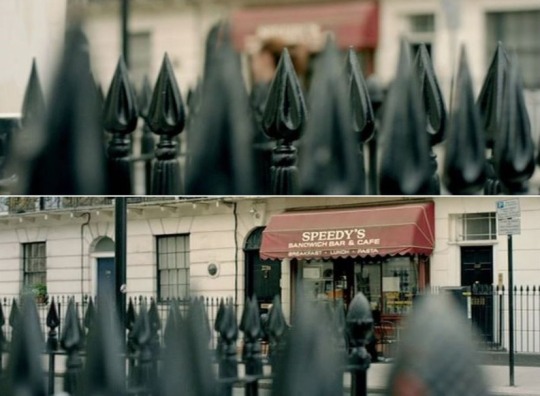
Three levels of spears stand like guardians in front of 221b Baker Street. Could those three levels symbolize the three stabbing victims of The Sign of Three? After all, each one of the three characters is depicted as guard, as protector ... and each one of them gets stabbed.
TBC below the cut ...

Stephen Bainbridge
He is a Private in the Household Guard of the Queen. The Grenadier Guards is an infantry regiment of the British Army. The current regiment is known as the 1st Regiment of Foot Guards … ’Every foot soldier bears the mark’ (Soo Lin, TBB). How surprising is it that the ‘East’ zooms in on Bainbridge before he gets stabbed by Jonathan Small?
Also … the gesture of the woman is interesting. Two Vs make a W (or a M … depends on the turning). It also lets me think of Culverton Smith’s W-gesture in TLD, in the short clip with the man disguised as cock (x).

Modern Grenadier Guardsmen wear a cap badge of a "grenade fired proper" with seventeen flames (x). Foot soldiers linked to exploding grenades … what a lovely coincidence, especially regarding the ‘passions’ grenade from TFP. :)

When the changing of the guards takes place, Bainbridge is already wounded and slowly dying. He got stabbed before the changing.
The name Stephen is of Greek origin and means ‘crown’ and ‘that which surrounds’. Saint Stephen was stoned to death and is regarded as the very first Christian martyr.
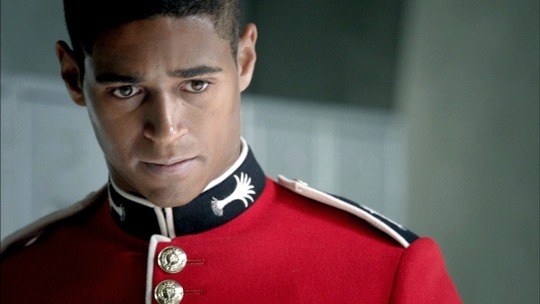
Another little detail caught my attention as well. Just a word used twice to describe a person.
SHERLOCK: “Elite Guard.” JOHN: Forty enlisted men and officers. SHERLOCK: Why this particular Grenadier? Curious.
And in TRF Sherlock sais:
SHERLOCK: This little boy; this particular little boy ... who reads all of those spy books. What would he do? JOHN: He’d leave a sign?
Max Bruhl left a sign. Stephen Bainbridge wrote a note. Not much of a difference, I think.
Guardsmen Max and Claudette
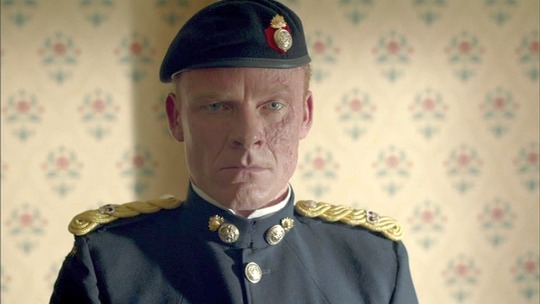
James Sholto
He is a retired Major of the Fifth Northumberland Fusiliers and Captain John Watson’s old commanding officer. A decorated war hero but not to everyone. Something went wrong when he led a team of new recruits into battle. ‘They all died’ (just like AGRA). Major Sholto, badly wounded, was the only survivor. Press and families gave him hell. Deaththreats and hate almost turned him into a recluse, into a most unsociable man, who spends his retirement way out in the middle of nowhere.
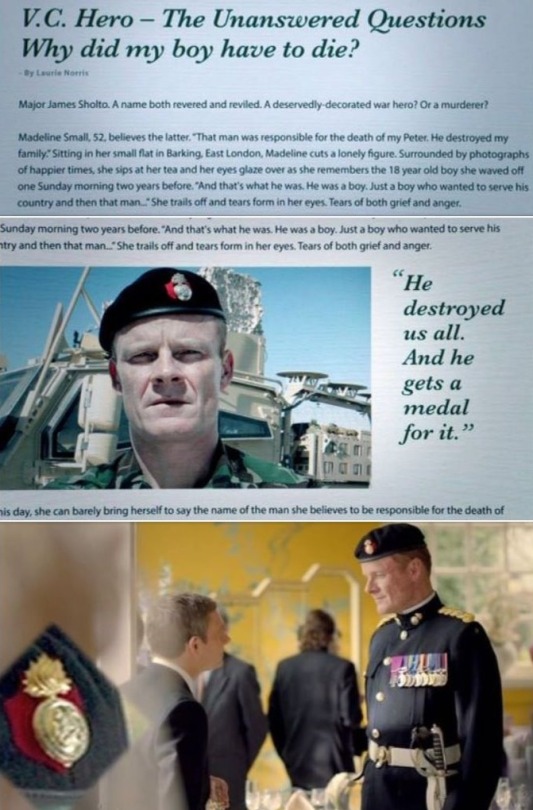
I’m quite sure this has been mentioned before, the 5th Northumberland Regiment on Foot (’foot soldiers’ too) still uses their ancient badge … St George killing the dragon (x) Every quiver of his beating heart
‘He destroyed us all’ … somehow these words sound very similar to the one Sherlock uses in TFP, in a situation where he considers himself to be a soldier: ‘Five minutes. It took her just five minutes to do all of this to us. Well, not on my watch.’
As mentioned above, Mary’s dialogue in TST matches the description about the incident with Sholto’s recruits almost identically … ‘something went wrong’/’but it went wrong’ … ‘I was the only one who made it our’/’they all died; he was the only survivor’. And Mary considered AGRA to be her family ... ‘we were family’.

Major John Sholto is an original character from ACDs novel The Sign of Four. His sons are called Thaddeus and Bartholomew. The renaming of the Major’s first name - from John to James - must have been a deliberate choice. A choice which is reflected in the skip code of TEH ‘John or James Watson … saint or sinner ... James or John’, as well as in John Watson’s middle name … Hamish (Scottish for James).
Major Sholto’s room number is ‘two oh seven’. This reminds me of the ‘double oh seven’ codeword for the ‘flight of the dead’ in ASIB. Two and double …. both means 2. Sure, the number on the door reads 207 but then, it happens several times in this story, that things told and things shown are sometimes not quite the same or vis versa.
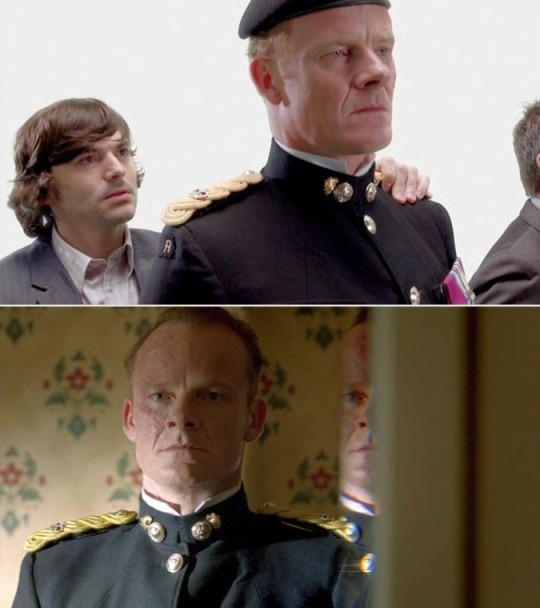
When the wedding guests leave the church and the reception takes place, Sholto is already wounded and slowly dying. He has been stabbed before.
Sherlock investigates the cases of both guardians
Bainbridge’s note reaches him sometime during the wedding preparations. John and Sherlock arrive just in time to save Private Bainbridge’s life. The case though remains unsolved.
Without knowing it at the time, Sherlock investigates Sholto’s case during John’s stag night. They call the investigation of the ghost-man the ‘Mayfly Man’ case. It remains also unsolved.
Sherlock includes both unsolved cases into his best man speech at John’s wedding and here at last, all the puzzle pieces fall into place and Sherlock is able to solve both cases, which are closely related. As a consequence Major Sholto’s life can be saved as well.
The person responsible for the attempts to kill Private Bainbridge and Major Sholto is:
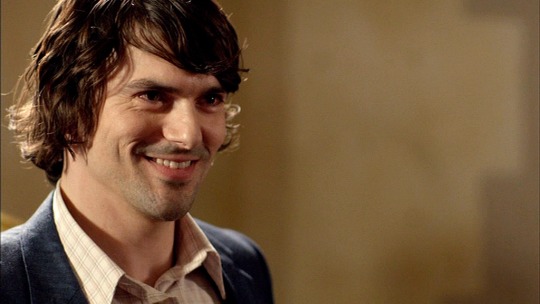
Jonathan Small
‘Brilliant, ruthless, almost certainly a monomaniac - though, in fairness, his photographs are actually quite good’ … that’s how Sherlock describes the killer. Small’s motive is revenge. He is convinced that Major Sholto is responsible for the death of Small’s brother Peter, who had been among the killed recruits. It seems that Private Bainbridge merely had the misfortune and got randomly chosen for the rehearsal of Sholto’s murder. But ... why this particular 'foot soldier’? (I’ll come back to that question later)
Jonathan Small grins like Jim Moriarty and wears a checkered shirt like John. He is a brilliant, ruthless monomaniac and obviously also a womaniizer who has no problems to woo half a dozen women, almost at the same time, into telling him well-kept secrets. Basically … a perfect blend of Jim Moriarty and traditional John ‘three continents’ Watson.
Like Major Sholto, Jonathan Small too is an original character from ACDs novel The Sign of Four. His name has not been changed. Only together with his female and not-canon counterpart Janine, Mary’s bridesmaid, who seems to be a lovely blend of Irene and Jim, the name chosen for the antagonist of this episode, appears to gain a special significance.
Janine - deiminutive of Jeanne, female form of John … ‘little Johnny’
Jonathan - diminutives are Jon, Jonni ... though not related to ‘John’ regarding the meaning of the name, it can still be heard as … ‘little Jonny’ (’You can talk, Johnny-boy. Go ahead.‘ Jim, TGG)
None other than ‘little Jo(h)nny’ (the H makes the difference) is responsible for the almost murder of Private Bainbridge and Major Sholto, the first two stabbing victims of this episode.
‘Little Johnny’ also happens to be another word for penis … the ‘meat dagger’.
Who’s the third ‘victim’ then?

Mary Elizabeth Morstan
She is a character full of surprises who starts as a simple nurse who marries John Watson in TSOT. Among Sherlock’s deduction-word-cloud in TEH the term ‘guardian’ can be found and only one episode after the ‘wedding’, Sherlock outs her as facade … his very own facade, because the Empty Houses in Leinster Gardens, on whose front walls Mary’s face is projected, are Sherlock’s property.
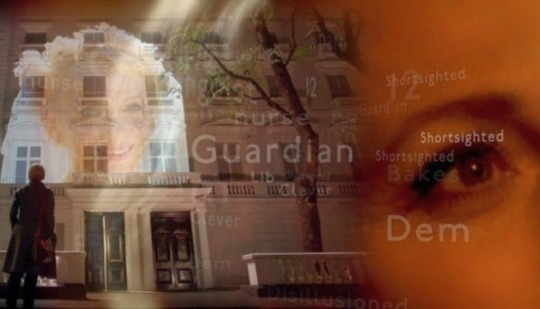
Mary Elizabeth Morstan isn’t her real name either. It’s the name of a stillborn child from a gravestone in Chiswick Cementry. This connects her character to the other stillborn child of this story ... Rachel Wilson, the pink lady’s daughter from ASIP. The initials A.G.R.A. stand for Mary’s true name, she tells later … but soon this turns out to be incorrect as well. A.G.R.A. was a group of four undercover agents who worked for the British Government. Prior to her ‘retirement’ Mary had been a member of that group. Sherlock describes her as ‘super-agent with a terrifying skill set’. Based on the current status, her two first names are Rosamund Mary … the family name is still unknown (if there even is one).
Why should Mary be the third stabbing victim?
Readers of my theories will probably know that I’m playing for a long time now with a mind palace scenario which stretches from the beginning, most likely in PILOT (or even before) to the end of S4 (x). Back then I wondered ...
Is it really so farfetched to consider the possibility that Sherlock tries to deduce and solve the mysteries and problems of his own live - and his falling in love with John - at first in his mind? Before he comes out?
Over decades - since ACD - the story of Sherlock Holmes and Dr. Watson has been told by the famous 'unreliable narrator’. Could it be that this time - with Sherlock BBC - the world will get the true story? Finally told by Sherlock himself? By looking right into his heart and mind and soul? By showing how his brilliant mind works? How his heart and soul expand and grow?
Would TPTB do such a thing? Stay in Sherlock’s mind over the span of multiple episodes? Follow his train of thought … show his evolution … in such a way? I don’t know. But it sounds thrilling to me. (Nov 2016)
Based on those early ideas I gradually came to the conclusion that Sherlock BBC tells the story of how Sherlock Holmes deduced his own persona. He does this the same way he investigates his criminal cases … by setting up scenarios in his mind and repeating those until he has found the correct solution (The Stage is set). Investigating his own case - the pink one - in such a way, would mean that all the characters which appear on Sherlock’s ‘mind stage’ represent different aspects of himself. Some of them may be based on real life persons, most of them are probably entirely created by Sherlock’s imagination. I like to compaire this process to a ‘mind journey’ or to a long (dramatic) dialogue, Sherlock holds with himself. This propably doesn’t happen during a dream or in a state of coma, as I thought back in 2016. A lot of time and thinking has gone by since then. Nowadays I presume that a conscious thinking process would fit better with the literal character Sherlock Holmes, whose deductions are always built on facts, science, reason and logic. It would be rather OOC that a man like Holmes would base an important, life changing decision on anything else than his razor sharp mind. Anyway, it’s just one of many theories.
Mary now … ever since I noticed the lot of similarities this character shares with Sherlock (x) my view on her started to change considerably. To me she isn’t the woman anymore who comes between Sherlock and John but instead the facade Sherlock Holmes created and married to his traditional, eternal friendship with John Watson for the sole purpose, to hide his romantic feelings and his sexual desire for the friend behind this protective wall. Mary is Sherlock’s facade, his guardian, his firewall … because:
John can’t ever know that I lied to him. It would break him and I would lose him forever – and I will never let that happen. Please … understand. There is nothing in this world that I would not do to stop that happening.
In my opinion, these are Sherlock’s own words and they express his fear of what might happen to the uinque friendship he shares with John, if the friend ever discovers the true nature of his feelings for him. Sherlock would do anything to stop that happening, even if this means that he has to incarcerate his emotions inside a high-security facility, behind elephant glass and chain his sexuality with iron bonds to a wall in a padded cell, like a hound from hell.
The ‘meat dagger’ incident
Sherlock tells the wedding guests - Major Sholto sits among them - about the unsolved Bainbridge case and asks if any of them has got a theory how that guard might have been stabbed. What kind of murderer can walk through walls, which weapon can vanish? Molly’s fiancé Tom (both characters are mirrors for John and Sherlock) assumes it could be a case of ‘attempted suicice by meat dagger’ ... something that would have been self administered.
A lot has been written since then about the ‘meat dagger’ as a metaphor for 'penis’ …. for ‘little Johnny’. :)

Sherlock sees only one feature of interest in the whole case … while he tried to solve the mystery, the eternal friend saved the life of the guard. And just the same happens a little while later with Major Sholto, the other guardian. It turns out that both men - both guardians - have been stabbed by the same killer … Jonathan Small … little Jonny, the meat dagger ....
There’s only one other character in this episode who has been stabbed unknowingly as well. That’s Mary. And in her case it’s indeed … ‘stabbed by meat dagger’ because Sherlock deduces her pregnancy by the end of the episode. Or expressed in computer language: the firewall has been penetrated by the virus.
The ‘father’ might be John or David, Mary’s ex. It doesn’t matter if one views the story metaphorically where all characters represent aspects of Sherlock himself. Going by his looks, David is clearly a mirror for John, while his history regarding the constant online observation of Mary, connects him to Mycroft, the brain. David seems to be a ‘blended’ mirror like Jonathan Small (John/Jim) or Janine (Irene/Jim). A mirror who represents the ongoing interest of the brain in the feelings hidden behind the facade.
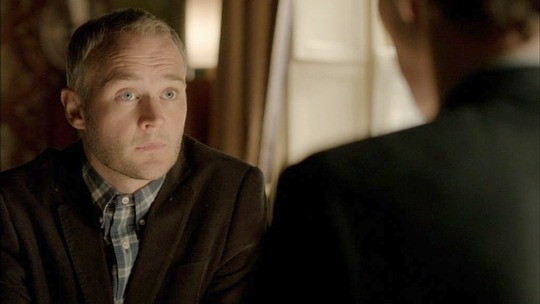
When Sherlock marries John and Mary, he puts a guardian in front of his true feelings for the friend. He tries to ‘downgrade’ those feelings. And yet, Sherlock allows three ‘social ancounters a year’ but ‘always in John’s - the traditional friendship’s presence’. That sounds very much like the ‘calculated risk’ Mycroft takes with Eurus. Both ‘brothers’ seem to be ‘love-addicts’ in need of a fix, once in a while … when the burden of ‘holding oneself to a higher standard’, of ‘keeping oneself right’ gets too heavy … or too boring. In that case it could propably happen that one takes the frustration out on the wall … then the wall has it coming … :)
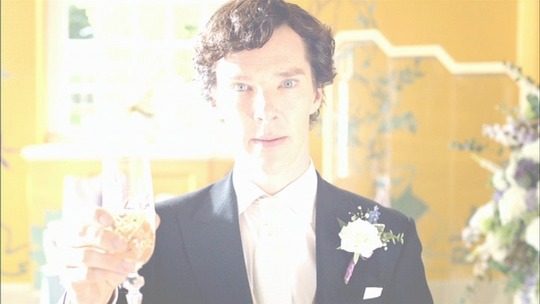
The moment of revelation
When Sherlock is blinded by the flashlight of ‘little Jo(h)nni’s’ camera, he suddenly realizes that the cases of Bainbridge and Sholto are connected. That the stabber has to be the same person. It’s the moment when the first domino piece falls and knocks over the next, and the next, and the next …. leading to a chain reaction of revelations at the end of which Sherlock knows without any doubt that his new facade had been penetrated again … this time though by a ‘kill shot’. He’d been hit by AMO (the perfect ammonition), fired by the crack shot that is his eternal friend. The seed of love has been laid without Sherlock noticing the ‘chink in his armour’ through which Cupid’s arrow hit home. Now love has taken root behind his facade and is growing.

The name chosen for that love is Rosamund - Rose of the world, as the dialogue in TST confirms. There’s a real rose of that name - Rosa Mundi - an old rose depicted in a work of Sandro Botticelli “Virgin Adoring the Sleeping Christ Child”. This rose is also known by the synonym ‘rosa versicolor’ - which means ‘rose of many or changing colours ... iridiscent’.
The word iridescence is derived in part from the Greek word ἶρις îris , meaning rainbow, It is the phenomenon of certain surfaces that appear to gradually change color as the angle of view or the angle of illumination changes. (X)
Sherlock - the ‘virgin’ he is called in ASIB by Jim and Irene - announces the pregnancy of Mary (I still wonder if this means that he is the 'Gabriel’ of A.G.R.A. - the angel who announces virgin Mary’s pregnancy). And during the stag night, John is labeled with ‘Madonna’. Another name for Virgin Mary. This turns the eternal friend also into the ‘virgin’, just like Sherlock and Mary. Another ‘sign of three’ one could say.
Three virgins - three novices - who will now start a new journey on a way they have never travelled before. Sherlock will finally encounter romantic love and accept it ‘it is what it is’, the facade will ‘get retired in a pretty permanent sort of way’ as the brain blatantly puts it in TST and the traditional ‘eternal’ friendship will have to change into a romantic-sexuell relationship. A morphing together of friendship and sex - John and James - would be a quite logical consequence, I guess.
In TST the little baby is christened with the name Rosamund, a name that can be traced back to ‘rainbow’ … Rosie for short. And rosy=pink!
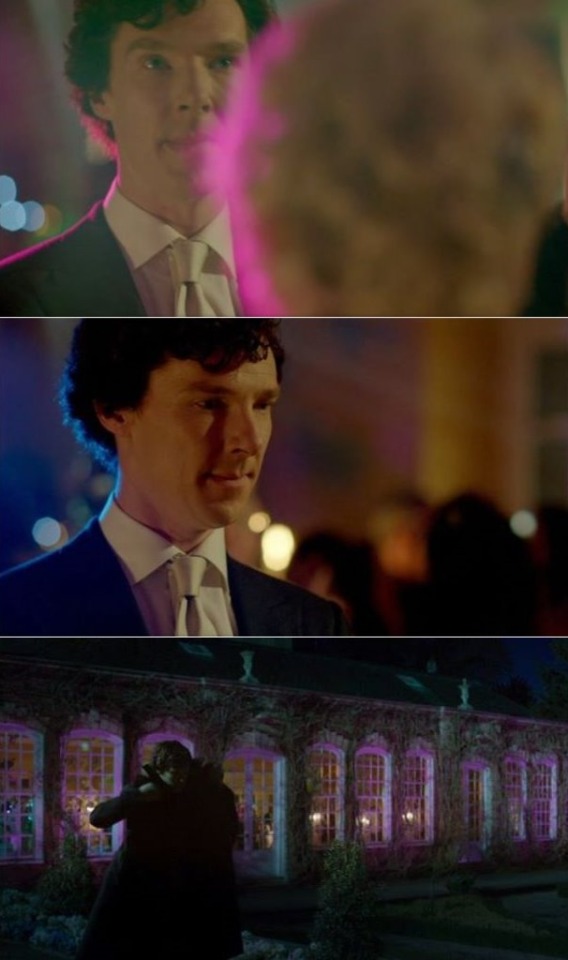
‘Oh, what a night! ... I was never gonna be the same … I felt a rush like a rollin' ball of thunder spinnin' my head around n' takin' my body under’
No wonder this song has been chosen by the creators to accompany this scene. Overwhelmed by emotions - surprise, confusion, amazement, shock, joy, panic, uncertainty, concern, fear - Sherlock isn’t able anymore to carry on with this ‘wedding’ .... with this renewed ‘changing of the guard’. He walks away alone into the night. The case is solved. Sherlock is aware of what happened. Now he has to deal with the consequences. Should he really replace his guardian again or should he finally stop pretending, stop lying, drop the facade and confess his deepest secret?
Because if you tell them and they decide they’d rather not know, you can’t take it back. You can’t unsay it. Once you’ve opened your heart, you can’t close it again.
This confrontation, Sherlock fights with himself, becomes the centrepiece of the following episode (HLV) where Sherlock is completely torn into. One half of his being, still protected by the facade, is at war with the ... ‘other one’, the slowly increasing emotional side of him. But somewhere deep inside his mind he probably knows already that this is a war ‘he must lose’. And so Sherlock has to go deeper ...
TAB doesn’t only take Sherlock back to his literal roots. In this episode Sherlock investigates again two of the main threads of the story and ties them together through the ‘bride’ … FALL and HOUND. Mary, the facade, feels already ‘left behind’ and John, who represents Sherlock’s now fully acknowledged, tender feelings, directed at his friend ... ‘does grow up so fast’. The episode ends with Sherlock, who throws himself into a torrent of water=emotions and follows Jim Moriarty, Mr Sex, down the Reichenbach Fall … right into the emotional rollercoaster that is Series Four.
Like the investigation in TAB, this series runs backwards as well. TST repeats the events of S2 and S3 while TLD zooms in on S1. I persume this happens because Sherlock applies an ability he describes to Dr. Watson as ... ‘reasoning backwards’:
“In solving a problem of this sort, the grand thing is to be able to reason backwards. That is a very useful accomplishment, and a very easy one, but people do not practise it much. In the every-day affairs of life it is more useful to reason forwards, and so the other comes to be neglected. There are fifty who can reason synthetically for one who can reason analytically…Let me see if I can make it clearer. Most people, if you describe a train of events to them, will tell you what the result would be. They can put those events together in their minds, and argue from them that something will come to pass. There are few people, however, who, if you told them a result, would be able to evolve from their own inner consciousness what the steps were which led up to that result. This power is what I mean when I talk of reasoning backwards, or analytically.” (ACD A Study in Scarlet, Conclusion)
There’s one important change though, which will alter everything. Sherlock now adds baby Rosie, the pink seed of love, the AMO-factor, to his equation. As a consequence his mask, his facade - that what ‘thatched’ and guarded him - crumbles and falls. And Sherlock accepts the change … It is what it is.
Then, in TFP, the third episode of S4, Sherlock puts the results of his deductions under the sharp lens of his emotional core, for the ultimate experiment … the final distillation … to produce at last a clear solution. Still missing is the chemical reaction that should follow the application of that solution, one might say. :)
Back to the three ‘guardians’
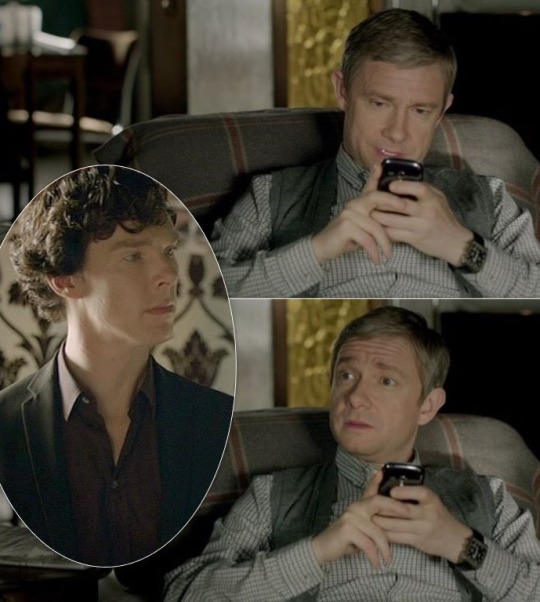
My husband is three people
During the wedding preparations, John tries to interst Sherlock for this curious case. John says the sentence ‘my husband is three people’ twice, interupted only by this short dialogue:
SHERLOCK: Major James Sholto. Who he? MARY: Oh, John’s old commanding officer.
Taking John’s words ‘my husband is three people’ literally, then he is talking about his own husband … which will soon be Mary. Husband, not wife, because Mary represents an aspect of Sherlock, his facade, his cover ... his ‘thatch’. As mentioned above, when Sherlock marries John to Mary, he puts a guardian in front of his true feelings for the friend … one could also say …. he places a commander at their/his side. And this is exactly what Mary does in later episodes. She decides who mowes the lawn, chooses the name of the baby and that it is her to take John home and not vis versa.
Husbands can be equated with facades, with commanders, with guards. All of them serve as protectors and defenders of Sherlock’s true feelings for the friend.
Who could have been the first ‘husband’ … the first facade, the first guardian?
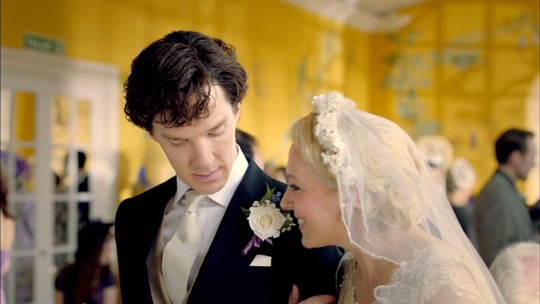
Neither of us were the first
This is what Mary tells Sherlock, while John welcomes his ‘privious’ commander. Is she really talking about sexuell experiences of her brand-new husband with another man, just to taunt Sherlock? Viewing the Mary-character as an aspect of Sherlock himself and not as a real wife that comes between two men, I heavily doubt this. Applying a metaphorical reading to the story, wouldn’t it be much more likely that this conversation is about their - Mary’s and Sholto’s - assigned profession. Neither of us were the first … guardian.
Mary is the husband to be, the most recently chosen facade, John’s new commanding officer, an undercover agent of the government.
Major James Sholto is John’s old commanding officer, Sherlock’s previous facade, which turned out to be not strong enough.
The only other guard in this story is Stephen Bainbridge, Private in the Household Guard of the Queen. The foot soldier named after Saint Stephen, the first martyrer.
And isn’t there somthing strikingly similar regarding those three guards as well as a noticeable increase in drama and strength, which so often happens when sequences are repeated on Sherlock’s mind stage?
Private Bainbridge guards the Queens Palace. The ‘East’ zoomes in on him, then he get’s stabbed by ‘little Jonny’ - the meat dagger - without noticing it. A changing of the guard takes place. Bainbridge almost dies beneath a shower of water.
Major Sholto guards the Queens country. He fights on a battlefield in the East beneath a burning hot sun. Something goes wrong and all the recruits under his command die. Badly wounded himself, Sholto has to leave the service and change into retirement. He gets stabbed by ‘little Jonny’ - the meat dagger - and almost dies.
Mary secretly works for Mycroft, the government, the ‘queen’ - as an undercover ‘super-agent with a terrifying skill set’. Her last operation took place in the East. Something went wrong and a lot of people died. It first looked as if Mary had been the only surviver (like Sholto). She marries ‘Johnny-boy’ Watson, gets stabbed by his meat dagger, becomes pregnant and …. dies not long after ‘PINK-RAINBOW-ROSIES’ birth.
The Sign of Three is about the ‘changing of the guard’. It takes place inside Sherlock’s head. But the marriage of John and Mary, that Sherlock arranges so heartbreakingly beautiful (and so strikingly yellow), turns out to be utterly pointless. Because the bride, the husband, the new commander, the facade is already pregnant ... had been stabbed before the wedding ... before the changing of the guard.
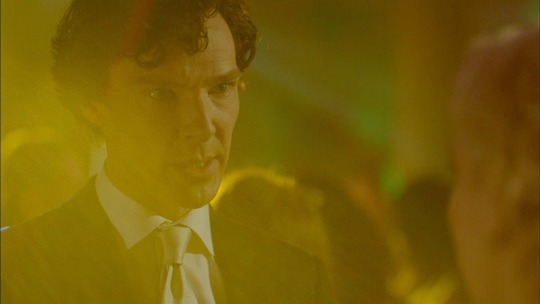
The Yellow Face connection
This isn’t new. It has been discussed before in this interesting meta About Yellow Face by @darlingtonsubstitution (sadly the part below the cut is gone) from 2017. As mentioned in the comments there, the creators of Sherlock BBC once refered to their favourite ACD stories. Yellow Face was among them but ... they wouldn’t be able to adapt it, because of the sensitive content, they said. This isn’t quite true though, it seems. On the contrary, the colour yellow features most prominently in Sherlock BBC … and not just the colour itself.
It starts with Sherlock’s and John’s first date at Angelo’s. The whole scene is drenched in yellow. PILOT even more than ASIP.
A secret code of ancient cyphers, sprayed in yellow paint, leads to the Yellow Dragon Circus.
Golden cats and big ‘yellow’ felines - lions - roam the story.
Yellow is the colour of the smiley face on the wall of the 221b living room.
There’s an assassin who carries a yellow ladder and a yellow tool case with a gun in it.
A bright yellow mask has been placed inside a box, alongside a train, a phone, nicotin patches and a note.
The main colour of the wedding ... bright yellow. It’s the wedding that leads Sherlock to the revelation ... to his love deduction.
A canary trainer, a trainer of yellow birds, turns out to be the killer.
Norbury, the case of the Yellow Face from canon, plays a vital role in TST
The finish of a race is marked with a bright yellow band that floats slowly to the ground while a ‘confessing’ serial killer, who is a mirror for John, passes as winner, signaling a W with his fingers, while the fingers from the ‘East’,, next to Private Bainbridge, signal a double V.
Yellow is the colour of the sun, of fire, flames and explosions.
Yellowbeard ….
But one of the most important links to Yellow Face is the following one:
JOHN: Mary, I may not be a very good man, but I think I’m a bit better than you give me credit for, most of the time. (Sherlock BBC, TST) 'I am not a very good man, Effie, but I think that I am a better one than you have given me credit for being.' (Grant Munro, The Adventure of the Yellow Face)
This piece of dialogue connects John to Grant Munro, the husband of Effie, the woman who hides her secret child from a previous marriage behind a yellow mask. She doesn’t do it out of some dark or sinister motive as Sherlock Holmes is convinced at first. Her former marriage had been legal and she'd loved her late husband dearly. Lucy, her little girl, can truly be called a child of love. But Effie fears to reveal Lucy, because the girl is ‘different' and the mother is anxious to lose the man she loves now, because of this. She is torn into between the love for her child and the love for her husband.
She (Effie) drew a large silver locket from her bosom. 'You have never seen this open.'
'I understood that it did not open.'
She touched a spring, and the front hinged back. There was a portrait within of a man, strikingly handsome and intelligent, but bearing unmistakable signs upon his features of his African descent. (ACD, The Yellow Face)
ACDs Yellow Face is a case without crime, without any devious betrayal. Instead, it’s about love and the fear to lose love, because at that time in ACDs story, it’s about a love not accepted by many.
'That is John Hebron, of Atlanta,' said the Lady (Effie), 'and a nobler man never walked the earth. I cut myself off from my race in order to wed him; but never once while he lived did I for one instant regret it. It was our misfortune that our only child took after his people rather than mine. (ACD, The Yellow Face)
In ACDs Yellow Face, the ‘first husband’ is of ‘African descent’ … just like Private Bainbridge, who is the ‘first guardian’ - the first of the three ‘identical husbands’ - in Sherlock BBC, The Sign of Three. He is the one who represents Sherlock’s earliest facade … the guardian of the Queen’s Palace.

Just like @darlingtonsubstitution presumed more than two years ago, I’m now more convinced than ever, that Moffat and Gatiss did adapt ACDs Yellow Face and they not only included it in Sherlock BBC, they made it into the main theme of their story (beside ‘hound’, ‘fall’ and ‘scarlet/pink’). In their version though, the focus shifts from ‘unacceptable’ skin-colour to ‘unacceptable’ sexuality.
Sherlock BBCs baby ... Rosie ... Sherlock’s baby ... represents love. And this love is pink and has been given a name that can be traced back to ‘Rainbow’. The Sign of Three tells the story of the ‘changing of the guards’ and how Sherlock finally discovers the AMO-factor that will alter his life completely.
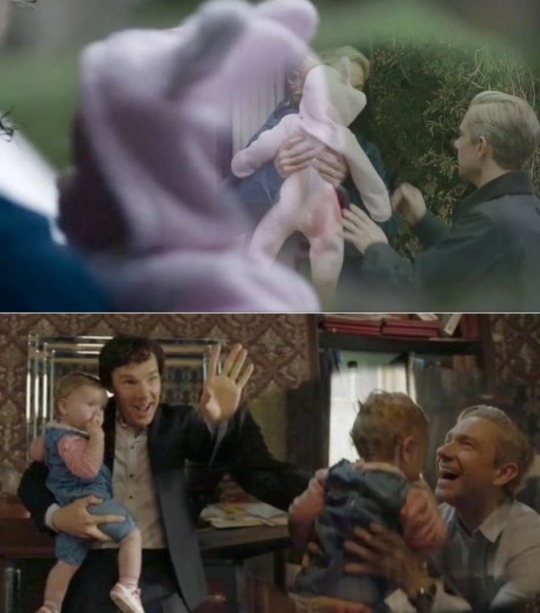
When I discoverd Sherlock BBC for the first time (back in 2011) I was thrilled by that fascinating crime drama and its two charismatic leads. Now, after 13 episodes, it has grown into so much more than just an excellent crime drama among others. The way I read it, Sherlock BBC is a wonderful and stunning story about equality. Inside Sherlock’s mind, the great detective doesn’t only solve the greatest secret of his life. No, the actors Sherlock chooses to represent the different aspects of his persona, are as diverse as the colours of the rainbow. They are old and young, male and female, beautiful and ugly, strong and weak, rich and poor. Neither gender, sexuality nor the shade of skin colour or from which corner on this planet someone comes, is of any importance. Anyone can be a part of this Sherlock Holmes. That’s what makes this adaptation so absolutely unique to me. Sherlock himself becomes the rainbow of his own story.
Thanks for reading to anyone who is still there. :)))) I leave you to your own deductions. And thanks @callie-ariane for your invaluable scripts.
December, 2019
________________________________________________________________
Episode spanning metaphorical reading of Sherlock BBC:
From PILOT to TGG …. About the meaning of S1
From ASIB to TEH …. The big question - what is the meaning of Reichenbach
#changing of the guard#sherlock bbc#metaphorical reading#the sign of three#guardians#commanders#husbands#edited pics
61 notes
·
View notes
Note
5 + 8!
5. SHARE A LITTLE-KNOWN FACT ABOUT AN ARTIST YOU LOVE.
After a quick glance at my blog, you can probably imagine that I’m chock full of these. Here’s a fun one for you. I’ve been a big fan of Ultravox ever since I was a young teenager, but it was an embarrassingly long time before I realized neither of their two frontmen recorded music under the real names.
Their original frontman, Dennis Leigh, originally wanted to be called “Johnny Vox,” but after a dressing-down from percussionist Warren Cann, determined that he and his comrades would be more than just Leigh’s faceless backing band and insisting to be called “Warren Ultra,” he retreated to being called “John Foxx.” I guess that might be for the better--it’s got less of an obviously punk sensibility to it, and while Ultravox very much got their start in that tradition, Foxx has gone on to become a hell of a lot more than that. “Dennis” is kind of a silly name, to be honest, and I don’t think I’d like to be called Dennis either...Foxx even liked the name “John” enough to give it to his own son years later, which is, honestly, kind of weird, if you ask me.
Ultravox were of course better known and more commercially successful after they started working with “Midge” Ure at the tail end of 1979. For years, years I say, I assumed “Midge” must surely be some given name, or diminutive of one, that was common in Scotland but one I hadn’t heard elsewhere simply because I grew up in the USA. Probably related to “Michael” or “Mitch,” right? Nope! That would just make too much sense. Ure’s given name is James. As a teenager, he played in a band with someone else called Jim, and the latter insisted that since he was older, he could stay “Jim,” but Ure would simply have to change. You can’t have two Jims in one band, that’s simply ridiculous. They reversed “Jim” to create “Mij” and then I suppose at some point started spelling it phonetically as “Midge.” This one is even more petty and ridiculous. And somehow, this name simply stuck with him over all these years. You could be forgiven for assuming, as some historical interviews do, that it has something to do with his size. He’s definitely a bit short--not more than 5′7″, I did meet him myself. Though it could be why it’s proven to be so sticky.
8. WHAT IS YOUR BIGGEST MUSICAL GUILTY PLEASURE?
THE SMITHS - “HOW SOON IS NOW?”
I don’t think pleasure should ever come with guilt--as long as nobody’s getting hurt, there’s nothing wrong with liking whatever you like. Someone wise once gave some very practical advice: if you’re not sure exactly how and why you like something, and it perhaps distresses you that you’re liking something outside of your usual musical taste, jot down the particular qualities or properties of this piece of music that seem to be getting your attention. They may be similar to what you usually like, or they may be different, but whatever the case may be, it can help you form a more integrated theory of what constitutes your personal taste, and what you look for in a piece of music.
I guess I should probably give an example of what I’m talking about. I’ve always been fascinated by “How Soon Is Now?” from first hearing it. But it’s rather clearly out of sync with the rest of my music collection, chiefly because it isn’t very electronic. However, if I break it down, almost all of the gears are turning for something I WOULD probably like. It’s got a driving and insistent rhythm that near dominates the rest of the track. While I’m not so much a fan of guitar, the way the guitar is operating here--the sudden, dissonant burst or stab on top of that rhythm--closely mirrors how a synthesiser might be used in what I normally like. And I like the style of the vocals very much, the deadpan delivery, the frustration and gloom, the vague but clearly ominous lyrical content.
Once you get a handle on why something appeals to you and you can situate it within the context of your own taste, I think it makes you feel much more in control of the situation, even if your taste and what we like and dislike are often not a matter of personal choice!
Thanks for the asks, friend! These were some especially fun ones.
7 notes
·
View notes
Text
Written in the Stars
Chapter Two: We’re Stars and We’re Beautiful
“You know our teachers are going to expect more from you, with the fact you’re a certified doctor, right?”
Bones rolled his eyes at Samarah’s teasing, already used to it after only a few days. Honestly, she was like the little sister he never wanted.
“And you have a masters in psych,” he countered “so you’re in the same boat. How did you manage that before your turned twenty-four, by the way?”
“Patience, determination,” she listed off, grinning “a whole lot of caffeine and zero social life.”
“Sounds like my residency,” Bones muttered, unable to stop a chuckle “I swear, though, if one more teacher asks if we’re related…”
“I take it as a compliment, especially considering how I never had any siblings growing up,” Samarah shrugged “it doesn’t quite help them that we do somewhat look alike.”
“Which I, frankly, find insulting to you,” he declared as they walked out of the lecture hall “you are way too lovely to have them going and comparing you to me.”
“Ah, is that your famous southern charm?” she teased, bumping him with her shoulder “don’t sell yourself short, Len, you’re a handsome man.”
“Kid, don’t start,” he grumbled, trying to hide his smile “I was starting high school by the time you were born.”
“Awww, don’t be so grumpy, gaezo,” Samarah reached up and gave his shoulder a pat “your inavva still thinks you look young.”
Bones bit back a retort at the compliment, not commenting on her calling him her brother. When he’d learned of Samarah’s heritage their first day, and noticed she casually used enochian in conversation-you could tell what she meant in context but still-he’d brushed up on the basics of the language.
“Come on, we said we’d meet Jim for dinner,” he told her “you know, he’d been really depressed this morning, but it looked like meeting you helped cheer him up.”
“I’m glad,” Samarah brightened up at that “he seems too kind to be as sad as he was.”
As much as he might have wanted to go on about Jim’s faults, Bones couldn’t help agreeing with her. In his heart, James T. Kirk was a good and kind young man.
When they finally left the building, it was easy to spot Jim. He was standing next to one of the stairway walls, leaning against it as he looked through his PADD.
Jim was smart, basically a genius, but he didn’t do that great in a normal classroom setting. It was no surprise he did so well, but not without struggle.
“Hey, Jim!” Samarah called out, smiling and waving to get his attention. When he looked up, Jim noticeably brightened before quickly packing his stuff up and rushing to join them.
~
Yes, he was very happy indeed to see his friends. Two friendly faces in a sea of students who ignored him and teachers who regarded him with unwanted pity or any other sort of emotion.
That was one of the reasons he liked taking Commander Gabriel’s class; the man challenged his students and treated them all the same. If there was anything the older man wanted to say about Jim’s personal or family history, he didn’t say it out loud.
“You guys ready to eat?” Jim asked as soon as he joined both McCoy’s “I’m starving.”
“Same,” Samarah agreed, already picking up the pace “let’s get there before the line fills up!”
“You know they don’t actually run out of food, right?” Bones questioned, both men almost having to put in an effort to keep up with her pace.
“Yeah, I just wanna be able to get a good spot!” She countered, turning and walking backwards to grin at them both “come on, you giants, lengthen your strides! I’m not that hard to keep up with, am I?”
When she turned back around, taking a bit of pity on the guys and slowing down some, both men couldn’t help giving each other amused glances, before bursting into laughter.
“Never been called a giant before.” Jim explained when Samarah gave him a confused look.
“Ah,” she nodded, laughing along with them “well, when you have my diminutive stature, most everyone’s a giant.”
�� “That’s fair,” Bones agreed, shaking his head and smiling a bit “still wouldn’t want to take you on in a fight, though.”
“Yeah, I had a few questions for you, actually,” Jim spoke up as they made their way into the dining hall and in line “once we sit down, I mean. Just about what you inherited from your angel family.”
“We can talk about that once we’ve found a spot to eat,” she agreed, looking back and smiling as she gave Jim’s arm a pat “I’m more than fine with talking about stuff like that, especially with my newest friend.”
Jim’s smile when she turned back around could have powered a starship docking station with how bright it was. She’d said he was her friend! This was definitely easier than expected.
Bones saw Jim’s smile, and was more amused than anything. Yet still, he was glad to see his friend had managed to make a new, actual friend. Jim wasn’t awkward, really, he was just…not what people seemed to expect.
Once they had their food and a spot to sit in a corner, near the windows, the three of them ate in silence for a bit, before Jim put his food down.
“So, I had just been wondering about what skills and abilities you’d inherited from your dad,” he explained, Samarah nodding along as she listened “maybe starting with why Bones wouldn’t want to take you on in a fight? Whatever your comfortable talking about.”
Samarah could see he was concerned about pushing boundaries, and completely understood; angels were a notoriously private race, with many topics considered taboo to discuss with a non-angel. However, being both half-angel and born on earth, Samarah didn’t share the same reservations; or at least, not as many of them.
“Well, to start with why Leonard wouldn’t want to fight me,” she started, smirking “other than my sheer scrappiness, at least; angels are as strong as, if not stronger in some cases, than Vulcans. I’m not the strongest, by any means, but I’m certainly stronger than the average human male. Perhaps on par with a weaker Vulcan.”
“What about your jacket?” Jim asked, earning Bones’ attention as well at that “Bones said you need those flaps sewn in for your wings?”
“I was born with wings,” she nodded “through I’m told I don’t have the same kind my father does. While wings are something only seen by a mate or family if not being used in situations where flight is necessary, each pair is unique to that angel and what they look like is generally common knowledge. My father, Azrael, has wings that look like a dragon’s wings. Most angels from Eden would use the title Zaldrīzes Tala as an insult, but being called the dragon’s daughter is a point of pride for me.”
“I thought you said yours don’t look like his?” Jim asked.
“And they don’t,” Samarah replied “mine match my hair in color, and they have feathers like a more typical pair of wings. Mine are shaped for flying long distances without relying on the wind.”
“What about those skills you talked about before?” Jim continued “the ones you said were useful in your future psych career?”
“Angels are highly sensitive and empathetic,” she explained “And I got those traits, as well. Being able to practically sense emotion, and be sensitive to it’s changes, helps in terms of helping others through their own issues and problems.”
Another ability she wasn’t sure whether or not she inherited was that of forging a mental connection with someone she had a strong emotional bond with outside of family. If she had this ability, as her uncle did, she hadn’t forged a strong enough bond with anyone by then.
“Wow,” Jim gave her a smile as he sat back “thanks for putting up with my nosiness. Whatever ship you get assigned to, they’ll be seriously lucky to have you.”
Samarah smiled in return, glad that things had gone well.
“It was my pleasure,” she insisted “besides, I know Leonard wanted to ask some of those questions, too.”
The scoff from their older friend had both Samarah and Jim laughing, before conversation turned to campus life as the three enjoyed their meal.
“Honestly, it’s not all that surprising no guy has asked me out since I got here,” she declared, shrugging as she cleared her plate “probably scared of what my uncle would do to them if things ended badly, or they just think I’m not pretty enough.”
“Well, it has to be the first one,” Jim asserted.
“Yeah, because that second reason is a damn lie,” Bones agreed as the three of them got up and went to put their plates away “you are not ugly, especially not by human standards.”
“But I’m still not most men’s type,” Samarah countered “most men don’t want someone half their size with twice their strength.”
“Cowards.” Jim and Bones simultaneously declared, causing Samarah to laugh.
“Good to know my friends appreciate my ‘tiny and mighty’ self,” she teased as they left the dining hall “well, I’ve got work to do. Leonard, you can give Jim my number, since you’ve got it already?”
“Sure,” he nodded, leaning down to let her hug him “I’ll see you tomorrow.”
“Jim,” she turned to the younger man, smiling “it was great to meet you, and I look forward to seeing you tomorrow.”
“Same here,” Jim replied, smiling as he leaned down to give her a tight hug “thanks for everything, especially for earlier.”
“Don’t hesitate to call me if you need to talk,” Samarah muttered into his ear “over COMM or in person, I don’t care. You’re my friend now, and I’m always there for my friends.”
“I’ll remember that,” he promised as he reluctantly pulled back “go on, I’ll see you tomorrow.”
Samarah waved as she headed off for the library, Jim and Bones watching her go before heading to their dorm.
“Anyone breaks her heart, and I’m breaking their bones.” Leonard declared, still miffed over her comments about how no one seemed to pay attention to her.
“I’ll hold them down for you.” Jim agreed, ignoring the knot in his gut. He was just feeling upset at the thought of Samarah being upset. That had to be it. She was his friend, and there was no way in hell he was jeopardizing that. At all.
He hoped that he’d be able to call her one of his best friends, one day. They certainly had the potential to grow that close.
Anyone hurt her, they’d have him to answer to.
#star trek#star trek aos#star trek fanficion#star trek kelvin timeline#star trek fic#written in the stars#james T kirk#leonard mccoy
4 notes
·
View notes
Text
You are my Sunshine
Chapter 2: Five Part 2
I already have some of my writing posted on tumblr, so I decided to post You are my Sunshine here to. Expect a new chapter posted every day, or read the whole thing on Ao3 right now. Enjoy.
It wasn’t as dark anymore. Did he fall asleep, it didn’t feel like he’d been asleep, being swallowed up by the darkness, but it hadn’t felt like being awake either. Whatever he had been, he was awake now, and the darkness was fading away.
Jim blinked, grass, he could see grass right in front of his face. He blinked again, and again, he could blink; and see and feel himself doing it. His body wasn’t surrounded by smothering blackness, he could see himself, and see himself move.
Jim twitched his fingers, watching them curl around the dirt, first one hand, then the other. Using the two hands together, pushed himself upright. Instead of grass, now he was looking at bark; a tree. Jim was sitting on the ground by a tree.
Jim looked left, then right, then left again; more trees, a forest, he was in a forest. For the first time since the blackness swallowed him, Jim was feeling a little less scared. His house was surrounded by trees, maybe it was close by, close enough to walk to.
Two hands raised, gripping the tree bark, holding him steady. Jim braced one foot against the ground, then the other one, then pushed. He was standing up now, but something was wrong.
He could move and feel his arms and legs, but they weren’t right, his hands and feet weren’t where they were supposed to be.
Jim wobbled in place, he wasn’t surrounded by blackness anymore, but now there were sounds; wind blowing the tree leaves, twigs snapping, hundreds of insects chirping.
Loud, everything was loud.
And the smells. The woods always had their own smell, like moss and wet dirt and green growing things, but now it was different. It was too much . The smell of the forest around him was pungent and strong, on top of all the usual smells there was a new sharp, musky smell.
His eyes stung, he wanted to puke.
An owl hooted, Jim snapped his head in the direction of the sound, a tree branch broke, he swung back in the opposite direction.
He stepped back against the tree; wrong, everything was wrong. His face, fingers and toes, arms and legs, they weren’t the way they were supposed to be.
A gust of wind hit him in the face, blasting him with a wave of smells.
Jim screwed his eyes shut and let out a high pitched wail.
Too much, it was all too much.
He crumpled against the side of the tree, squeezing his eyes shut and clapping his hands over his ears to shut out the sounds of the woods.
None of this was right, he wasn’t right.
Jim curled up on the ground and started to sob.
*
Nothing, absolutely nothing.
Barbara stood in the center of the living room, panting. She had searched the entire house from attic to basement, every nook and cranny, and found no trace of Jim.
She couldn’t move, she wanted to scream, look under the couch and behind the water heater again; because maybe this time, this time, Jim would be there. Where was he, what could have happened to him? Little boys didn’t just vanish into thin air while they were taking their baths.
Breathe, breathe, she needed to think logically. Jim wasn’t in the house, she knew that much. Where could he be, should she call the police, should she have called them an hour ago when she first noticed Jim was missing? What if he was somewhere she just hadn’t looked?
Outside, maybe Jim was in the backyard. A tiny corner of Barbara’s mind whispered that Jim was no more likely to be outside than any other place she had looked and that she was grasping at straws. Swallowing her doubts, she rushed out the back door.
It was the same as the rest of the house; barren, vacant, no sign of Jim anywhere. Unwilling to admit to herself that Jim was well and truly missing, Barbara searched the yard. Around the side of the house, behind the decorative boulders, all along the perimeter fence.
It was no use, Jim wasn’t here.
She sank to her knees, tears prickling her eyes. Barbara buried her face in her hands and let out a gut wrenching sob. Gone, her baby was gone.
Headlines and news banners flashed behind her eyes. Children that vanished from their parent’s care. Sometimes they were found; damaged, tortured, frightened, and occasionally dead. Sometimes they were never found at all, swallowed up by the cruel world that had stolen them away. Was that going to be Jim, was she going to see his picture plastered all over the evening news, spend days, months, years, wondering if she was ever going to see her baby again?
Another sob broke through the silent night air, but not hers. Barbara felt her heart stop; could it be, did she really hear that, she hadn’t just imagined it out of desperation. A second sob called out, confirming that it was not a figment of her imagination. She stood up and looked around, trying to determine the source of the sound. One more soft cry, coming from the woods, this time it was clear enough for her to recognize, Jim.
Overwhelming relief, and paralyzing fear battled for dominance in her mind. Jim was close, but was he alright, was he injured, in pain? Barbara dashed into the trees, trying to determine where Jim’s cries were coming from.
She shouted into the dark woods “Jim!”
Another sob, closer this time, she was heading in the right direction.
“Jim, if you can hear me, I need you to come closer,”
The crying continued uninterrupted, if Jim had heard her he was too scared to respond. Barbara rushed even faster towards the sound, stumbling over rocks and bushes, nearly tripping multiple times. Jim’s cries were steadily getting louder as she got closer. She glimpsed a small figure huddled at the base of a tree and stopped short.
“Jim?” Barbara whispered as she took a tentative step closer, not wanting to frighten him.
He ignored her, keeping his face buried between his knees, sobbing.
“...Jim…”
Suddenly, as if just now noticing her, he snapped his head up.
Barbara felt as though she’d been punched in the stomach; involuntarily, she staggered back.
His features were foreign, inhuman; navy blue skin, nose flat and hooked, underbite with diminutive tusks, ears tapered to a narrow point.
Coldness seeped into Barbara’s core, her brain refused to process what her eyes were seeing. This creature wasn’t her son, she didn’t know what she was looking at. This…this thing couldn’t possibly be Jim.
The two of them stared at each other; unblinking and silent, until a soft murmur broke the silence.
“Mommy?”
She looked into his eyes, familiar bright blue eyes, the same color as her eyes.
It clicked. This was Jim, this was her boy.
Barbara kneeled down and opened her arms “It’s ok honey, come here,”
Jim’s bizarre features crumpled as he scrambled into her embrace with a sob.
“mommy, mommy, mommy…”
His cries trailed off into bawling as he buried his face in her shoulder. Barbara wrapped her arms around him and pulled Jim into the tightest hug she could manage. Her baby was here, alive and safe.
But he wasn't the same child she had left in the bathtub.
Guilt washed over her. This was Jim, not some grotesque beast, her son. But the changes he had undergone couldn’t be ignored. Even with his face buried in her shoulder she could tell. His skin was hard, like stone, but it didn’t seem to prevent him from moving. Holding him in her arms was not unlike what Barbara imagined cuddling a marble statue would feel like.
Barbara adjusted her grip on Jim and hoisted herself up while balancing him on her hip. Heavier, he was so much heavier “It’s ok sweetie, you’re safe,” she crooned into his ear “Mommy’s got you,”
Jim sobs continued uninterrupted, but he tightened his arms around her in response. Home, she needed to get Jim back into the house, before anyone saw him like this. Still carrying Jim, she walked through the dark forest back to the house. Carefully, Barbara opened the back door without setting Jim down and flicked on the kitchen light.
Jim shrieked and buried his face deeper into her shoulder, trying to curl up even tighter against her. Frantically, Barbara fumbled for the light switch. No lights, were they too bright, did they hurt him?
Upstairs, she needed to get Jim upstairs into his bedroom. There they could calm down, figure out what had happened to him.
Balancing Jim's weight on her hip, Barbara made to precarious trip up the stairs and into Jim’s room. Gently, she detangled his arms from around her and set him down on the bed. He stared up at her, shivering and crying, still naked from his bath.
“Let’s get some PJ’s on, ok kiddo?” Barbara reached into the dresser and pulled out Jim’s favorite dinosaur pajamas, only to be hit with another unsettling realization.
Jim had grown significantly; clothes that had fit him perfectly a few hours earlier couldn’t even be forced over his longer arms and legs.
Trembling only slightly, Barbara carefully replaced the pajamas in the dresser. She needed to be calm, Jim needed her to be calm. He was upset enough already, he couldn’t see her break down to.
James, he had left some old clothes of his that were now sitting in the Goodwill pile.
“Jim, I’m going to go get some clothes for you, will you be ok by yourself for a little bit?”
Jim didn’t respond at first, still trembling and crying softly, before he looked up and nodded.
In spite of everything, Barbara couldn’t help but smile; her brave boy.
“I’ll be right back,”
As fast as she could, Barbara dashed down to the basement and grabbed a T-shirt and a pair of shorts before running back upstairs. Jim was sitting on his bed, right where she had left him. As best she could, she dressed him in the now oversized garments. Once she was done, Barbara sat next to him and began rubbing his shoulders in soothing circles.
Jim was marginally calmer now. He was still curled up in a ball and trembling, but he had stopped crying. Now was probably a good time as any to start asking him questions.
“Jim,” she spoke clearly in a low, soft tone “Can you tell me what happened to you?”
“I dunno,” Jim whimpered in a tone that was very close to a whine.
Barbara was silent for a few beats. Jim was still very upset, whatever had happened to…change him, it was likely he didn’t fully understand it. He was only five years old. Hell, she was an adult and she didn’t understand any of this.
“Just tell me what happened when you were in the bathtub, after I left,”
Jim sniffled and stuttered out an answer “I put the bath bomb in, and then the water got dark and pulled me down, and then I was in the woods, and-- and-- an--” he trailed off, on the verge of slipping back into hysterical sobs.
Barbara quickly wrapped an arm around him and pulled him close, cooing comforting nonsense sounds into his ear. She hoped Jim didn't notice how badly her hands were shaking.
From what Jim said it sounded like the bath bomb was responsible for his transformation. But that was ludicrous, it was a lump of baking soda and scented oil, it was impossible for a bath bomb to do….this.
But then again they'd left impossible in the rearview mirror a while back.
Jim pulled back from Barbara's embrace just enough to look up at her, his sniffling had evolved into frantic panting “Wh-- what happened! Why am I like this!”
That was the question wasn’t it, knowing the root cause didn’t even come close to answering all of the questions she had.
How had the bath bomb changed him, what had it even changed him into? Barbara was no closer to these answers.
“I’m not sure sweetie,”
Jim’s face fell “I don’t wanna be like this!” he wailed “Can’t you-- fix it, change me back-- please!”
Barbara combed her fingers through his hair as he broke down into sobs for the second time that evening, hoping that he couldn’t see her own tears. She wanted more than anything to make this all better, to give him answers, to support his belief that mommy could fix anything; but she couldn’t. Barbara was just as much in the dark as Jim was.
Just when she finally felt composed enough to say something comforting her fingers ran over a bump on Jim’s head. Not quite believing what she had touched, Barbara examined his scalp with her fingers, in doing so she found a twin bump mirroring the first.
Horns.
Dear god he had horns.
The dam burst inside her, what was she going to do. Barbara didn’t know how Jim’s altered state would affect his health. He didn’t appear to be in any pain right now, but that could change. God only knows how his stony flesh would react to a young child’s rapid growth.
Barbara squeezed Jim against her so tight, if he hadn’t changed into a living sculpture she would have been worried about hurting him.
She couldn’t let anyone see him like this, not teachers, not neighbors, not anyone. If this got out, Jim would be locked up or worse.
Barbara didn't want to think about worse.
Where did that leave her, she couldn’t just keep him in the basement forever, what kind of life would that be?
Barbara wept openly, well beyond the point of worrying about how Jim would react to her tears. Jim was still bawling his eyes out, even if he had noticed that she was crying to, he was so upset that it couldn’t push him into a further state of distress.
Exhaustion and despair weighed on her like a lead blanket, Barbara laid down on the mattress with Jim curling up against her.
Try as she might, Barbara couldn’t see a way out of this. Both of their lives had been irreversibly altered for the worse.
5 notes
·
View notes
Text

Ralph shuffled down the hall, a mug tight in his grip. The refreshed tea warmed his hands, but there was little that might warm his heart. Another corporate job, another set of long halls and failing tech systems.
Another group of long faces and longer days. The position might be new, but the experience was bound to be the same.
“Ralphie!” A taller man shouted, which was irritating both because of the diminutive of his name and the fact that jim-john?-james was standing five feet in front of Ralph. The shit-eating grin was off-putting too.
Ralph blinked and took a sip of his tea.
“Yes?” He asked when Jordan-Joey? Something with a J just kept staring.
“We can’t’ imagine a world without you.” The other man said, his grin unflinching in the face of Ralph’s obvious disinterest.
“That’s nice.”
“No, really. We cannot imagine a world without you.” Jake insisted, words grinding against his clenched teeth. ‘We’re not allowed. We’re not allowed to do anything the company disapproves of. They’ll be coming for me now. Run.”
The Author isn't too happy about getting a full time job working for the man, but at least there are inspirational signs like this to keep her creativity flowing. Also, this scenario is nothing like my real job, which has been great!
#Writeblr#flash fiction#jessica betts books#theauthorandi#original content#Got a job#New job#Amazing job#Unsettling story
2 notes
·
View notes
Text
“diminutives of ‘James’ include Jamie, Jim, Jimmy, Jimmie, Jimbo, Jimothy, and others” yall,,,,,,,,,watch me have tony literally call rhodey every single one of These
#JIMBO I M FU CKING#later when rhodey's dating bucky tony's gonna be like 'HEY JIMBO HOW'S JIMOTHY?'#rhodey's gonna stop talking to him for an entire month
10 notes
·
View notes